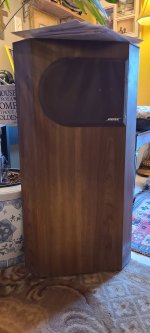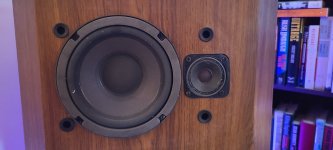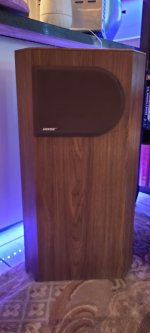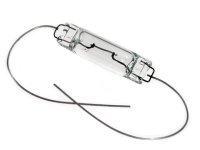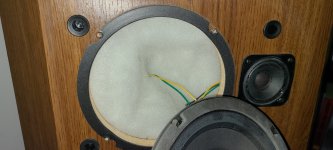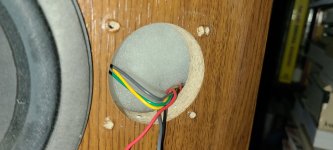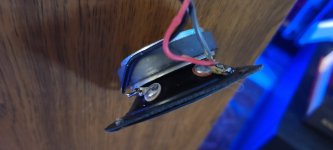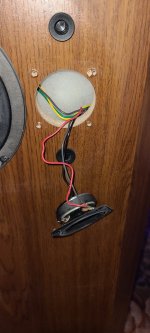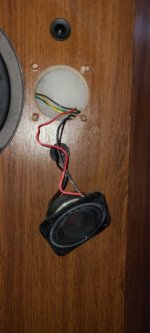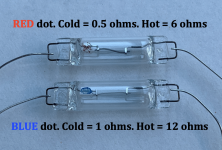I am new to this site and am hoping you guys can assist me with some improvement modifications to my pair of Bose 401's I picked up at an estate sale. The cabinets are in perfect condition, the grills are good and original, and the drivers and tweeters are fine (I replaced one tweeter with a replica of the size and specs that was broken.)
As seems to be the case with these speakers, the highs are muddled. Those from the left tweeter almost sound as if the tweeter is blown, but it is new, so that is not the case.
A user on a different Audio site said that he performed the following mods on his 401's and the result was a much improved sound. He has not revisted that site recently, so my questions to him about the specifics of how he did it and where he got the materials remain unanswered. I am hoping someone here can provide those answers.
Here is what he did:
_____________________________________________________________________
I got a pair of Bose 401s.
One of the cabinets was falling apart and I ended up gluing the cabinet back together. The cabinet workmanship is pretty poor quality. The woofers have no crossover and the tweeter uses an inferior electrolytic capacitor. The wire that Bose uses internally is small gauge, single strand telephone wire.
________________________________________________________________________
Any help you can provide is greatly appreciated! I want to enjoy these speakers, but right now I am just not getting a good quality audio reproduction. I had a pair of 501 Series IV speakers many years ago and they sounded great; much better than these 401's!
Thank you!
As seems to be the case with these speakers, the highs are muddled. Those from the left tweeter almost sound as if the tweeter is blown, but it is new, so that is not the case.
A user on a different Audio site said that he performed the following mods on his 401's and the result was a much improved sound. He has not revisted that site recently, so my questions to him about the specifics of how he did it and where he got the materials remain unanswered. I am hoping someone here can provide those answers.
Here is what he did:
_____________________________________________________________________
I got a pair of Bose 401s.
One of the cabinets was falling apart and I ended up gluing the cabinet back together. The cabinet workmanship is pretty poor quality. The woofers have no crossover and the tweeter uses an inferior electrolytic capacitor. The wire that Bose uses internally is small gauge, single strand telephone wire.
- I added a small Neodymium magnet to the center of the magnet structure on all of the speaker drivers. The result was faster transients and reduced "audio blur".
- I replaced the tweeter's capacitor with a good quality polypropylene 4uF capacitor.
- I added an inductor with a 4 ohm resistor across the inductor for the main 6 ½ inch woofer and ran the "surround" 6 ½ inch woofer straight.
- I replaced all of the wires with 16-guage wire.
________________________________________________________________________
Any help you can provide is greatly appreciated! I want to enjoy these speakers, but right now I am just not getting a good quality audio reproduction. I had a pair of 501 Series IV speakers many years ago and they sounded great; much better than these 401's!
Thank you!
Attachments
the highs are muddled
Welcome to the forum!
In the first instance you should replace the tweeter's ageing bipolar electrolytic capacitor with a modern equivalent.
Over the years, electrolytic capacitors can change significantly in capacitance and series resistance values.
Replacement will return the capacitor to the original specifications and hopefully restore the missing 'sparkle' to the tweeter.
I suggest you try this before attempting any other modifications then report back on your findings.
P.S. A photograph of the capacitor will confirm if it is an electrolytic or film type. Bose used a film (polypropylene) type in the 301 Series II I renovated.
Last edited:
It the 4.0 uf capacitor has two pinched ends, it is electrolytic and suspected of excessive age.
If the ends are not pinched and it is marked PP or MKP somewhere, is it already polyprophylene.
Here is one source of suitable capacitors in Ohio. https://www.parts-express.com/Dayton-Audio-PMPC-4.0-4.0uF-250V-Precision-Audio-Capacitor-027-226 Another supplier in Florida is Madisound. Also USspeakers
Usual suppliers like digikey, newark, mouser, do not usually stock >100 vac polypro capacitors. The one I listed is a 250 vac, good for >800 w/ch use.
If the ends are not pinched and it is marked PP or MKP somewhere, is it already polyprophylene.
Here is one source of suitable capacitors in Ohio. https://www.parts-express.com/Dayton-Audio-PMPC-4.0-4.0uF-250V-Precision-Audio-Capacitor-027-226 Another supplier in Florida is Madisound. Also USspeakers
Usual suppliers like digikey, newark, mouser, do not usually stock >100 vac polypro capacitors. The one I listed is a 250 vac, good for >800 w/ch use.
Last edited:
Personally, without a way to measure said capacitor, I wouldn't just throw parts at it.
A lot of what your hearing is the woofers. One or more of those could be compromised. The tweets are usually crossed fairly high. That said I don't see many of those woofers with issues as they are very similar to the 201's.
I also wouldn't agree with all the "upgrades" from the other person.
A lot of what your hearing is the woofers. One or more of those could be compromised. The tweets are usually crossed fairly high. That said I don't see many of those woofers with issues as they are very similar to the 201's.
I also wouldn't agree with all the "upgrades" from the other person.
Our posts crossed!
The capacitor (and I'm pretty sure it's an electrolytic) is attached to an internal wall of the speaker. It sits on a little damping pad.
The capacitor (and I'm pretty sure it's an electrolytic) is attached to an internal wall of the speaker. It sits on a little damping pad.
A meter to test ESR of a 4.0 uf capacitor is $94 +freight. https://www.newark.com/peak/72-1283...2000mf/dp/56Y1286?ost=peak+esr+meter&cfm=true Capacitance measurement is not useful. The dried up ones usually read 10% high. If it is polyprophylene, those last forever in speakers. 2 new polypro caps are $9 plus freight ($9 to my house from Ohio).
Where do I find the caps? With poly-fill so jam-packed inside the cabinet, I am unable to find them. Since the cabinet is not able to be opened without damaging it, please let me know how to locate those caps.
Thanks!
Thanks!
Attachments
For your information, the capacitor and protection lamp are wire wrapped to posts screwed into the enclosure wall.
When removing a wire wrapped component, snip its leads at the posts but don't remove the wire which is wrapped round the posts.
The replacement component can then be soldered to the wire wrap instead of directly to the post which, not being copper, may not take solder.
P.S. Work with the speaker on its back so that no strain is placed on the wiring by dangling drivers!
When removing a wire wrapped component, snip its leads at the posts but don't remove the wire which is wrapped round the posts.
The replacement component can then be soldered to the wire wrap instead of directly to the post which, not being copper, may not take solder.
P.S. Work with the speaker on its back so that no strain is placed on the wiring by dangling drivers!
Got it, thank you! It's too bad the cabinets do not have an access panel cut into them on the rear.
A bad protection lamp can make a scratchy sound in the tweeter as the woofers vibrate it. There are three different values used, designated by a colored dot on the lamp.
Just to be clear, I'm the passive speaker repair tech for Bose in the USA.
Just to be clear, I'm the passive speaker repair tech for Bose in the USA.
There are three different values used, designated by a colored dot on the lamp.
I believe it is a red dot that is fitted in the Bose 401.
P.S. I'm aware of the red and blue dots (see attachment). I'd be interested in knowing about the third value.
Attachments
Check if there is something on the back of the terminal block.Where do I find the caps?
- Home
- Loudspeakers
- Multi-Way
- Information request for modifying Bose 401s
